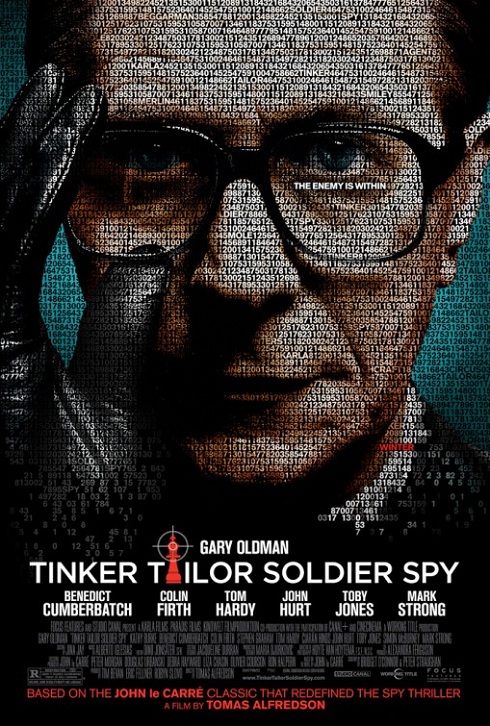Tinker Tailor Soldier Spy (2011)
Tinker Tailor Soldier Spy sees Oscar nominations for Gary Oldman as George Smiley, for Peter Straughan and Bridget O’Connor (now sadly dead) as the scriptwriters tasked with adapting the novel by John Le Carré, and Alberto Iglesias for the music. It’s been variously nominated for awards by BAFTA, BIFA and others in foreign parts. To that extent, critics and those who vote for awards seem convinced this is a film of great merit. This is not necessarily reflected in its box office performance where it has taken only about $65 million around the world. Such relatively poor performance might indicate the potential audience views it as an art house film and of limited interest. The higher rating, undeserved in my view, may also be a deterrent.
Naturally I watched the BBC serialisation back in 1979. Checking back, it was in seven parts although, apparently a slightly shorter six-part version has been produced for distribution by DVDs. This means a sizeable percentage of the audience will have seen Alec Guinness play George Smiley. Not having read the book, I remember how I worked out who the mole must be long before he was unmasked. It was the best actor not to have been given major screen time. Naturally, Alec Guinness and the actor involved had a long conversation at the end. So, since all the awards have focused on the Oldman performance, I suppose that’s the best place to start. As a character, Smiley is supposed to be quiet if not taciturn. This always represents something of a challenge to actors who prefer to be seen doing things, even if only speaking. The solution comes from the director Tomas Alfredson and the scriptwriters who have included extended flashbacks to a party held at the Circus, particularly showing where Smiley becomes aware of his wife’s infidelity with another of the spies, getting him drunk to tell the story of his meeting with Karla (the lighting is particularly effective in cloaking half his face in shadow), and allowing him to seem more of an action figure when threatening to send Toby Esterhase (David Dencik) out of the country. The significant editing down of the plot also means there are fewer pauses between the odd questions he asks and the instructions he issues. For all this, the performance is slightly monotonous. When you might expect him to unwind a little, as with Connie Sachs (Kathy Burke), there’s very little animation. Although the performance fits the character and is nicely nuanced with very small movements to indicate an internal life, I prefer Alec Guinness.
Now as to the cinematography from Hoyte Van Hoytema, this is beautifully shot with muted tones as clouds of smoke drift across rooms holding anxious men. By using rather flat lighting, it creates a sense of the paranoia that was pervasive at the time. Unfortunately, all the really good news stops there. The major problem comes with the constraint of time in the cinema. Although I have not read the book, it’s obvious from the television adaptation that it’s a subtle work, packed with detail on the spycraft, considering the art of being a spy at a difficult political time, while pursuing a challenging investigation. You cannot take something so multilayered and condense it down to two hours without sacrificing a lot.
In this case, the process of editing has produced a focus on the investigation from Smiley’s perspective with very little time given to establish the characters of the suspects. Ironically, you get to see more of foot-soldier Peter Guillam (Benedict Cumberbatch) and Control (John Hurt) after he dies, than you do of Percy Alleline (Toby Jones), Roy Bland (Ciaran Hinds) or Bill Haydon (Colin Firth). This makes the plot more difficult to follow. I don’t mind a more impressionistic approach to adaptations when the subject matter is more suitable. But the investigation to identify a possible spy is not something you can gloss. It depends on details. When those details are missing, even the most dedicated viewer will struggle unless he or she has read the book or seen the longer BBC adaptation. Frankly, I would have ditched the party sequences to allow more time to establish a clearer context for the investigation and a better view of the suspects.
This is not to deny this is a very good film, but it does explain why it has not been shortlisted for best film in most of the awards. Even in the BAFTAs where you might have expected the maximum support, it failed to win “best”. Overall, it’s most successful when all it’s trying to do is create a mood of the times. There’s a moment of sadness marking the passing of an era and signalling a possible need to bring in a new generation when Kathy Burke as Connie Sachs says of WWII, “At least that was a real war. English men could be proud then.” So go and see Tinker Tailor Soldier Spy if you know and like the story, or if you’re prepared to invest considerable effort in following the backstory as it emerges through the flashbacks. As cinema adaptations go, it’s very good. If the production team had had more time to play with, it could have been better. There is a slight element of tragedy here. The producers assembled a high class cast and then did not give them enough to do.





Reblogged this on beddyburc.